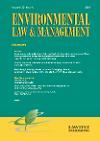Environmental Law and Management - Volume 30 - Issue 6

Legal aspects of application of the method of estimating environmental flows in the protection of riparian ecosystems dependent on waters
MARCIN PCHAŁEK
Behave Eco
IRMINA GRZEGRZÓŁKA
Babel Tree
This article was prepared following an R&D project entitled ‘Adopting the method of establishing environmental flows’ conducted by the National Water Management Authority in Poland in 2015. The project was launched in connection with European debate on adopting normative regulations for securing ecological flows. Throughout this article the authors focus on the less frequently examined topic of over bank flows with the primary intention of referring to the requirements set out in international and European law on environmental and nature protection.
COP24, the Paris rulebook and diminished expectations for COP25
ALEXIOS ANTYPAS
Associate Professor, Department of Environmental Sciences and Policy,
Central European University
The 24th Conference of the Parties to the UNFCCC, also meeting as the 1st Meeting of the Parties to the Paris Agreement (CMA 1), was the most significant COP since COP21 in Paris that produced the Paris Agreement. As expected, COP24 produced the ‘rulebook’ for the Paris Agreement, the rules and procedures to implement the Paris Agreement in the key areas of mitigation, adaptation, transparency, finance, stock takes, capacity building, loss and damage and other elements of the Agreement. The only area for which the COP could not finalize rules was for article 6 of the Agreement that addresses market-based instruments. In short, the Paris Agreement will be put to work and COP24 will, by and large, be counted as a success in the history of these events. Yet the prospects for keeping human-caused climate change to within 2 degrees Celsius, much less the 1.5 degrees that the IPCC considers to be the upper bound of safe, seem perhaps more remote than ever.
Rethinking hardship clauses in times of changing climate
ELIZABETH OGER-GROSS, KIRSTEN ODYNSKI, MARIÈLE COULET-DIAZ
White & Case LLP, Paris
This article considers the role of domestic laws and of contractual hardship clauses in the current context of climate uncertainty and assesses whether a claim for hardship based on a climate change event can be successful. The authors consider in what ways climate change can impact contractual performance and then briefly examine the legal doctrine of hardship as it exists in the laws of a number of jurisdictions. Thereafter, the authors analyze whether climate change-related events could meet the requirements and trigger the protection offered by hardship provisions, both legal and contractual. The article concludes by setting out key considerations and drafting tools to allocate climate-related risks through hardship clauses.
Case Commentaries
M4 Relief Road
ROSALIND ENGLISH
1 Crown Office Row
How South Africa’s recently introduced carbon tax may impact you
MIKE WEBB
JEAN VAN WYK
Baker McKenzie, Johannesburg
CJEU waste ruling on returned consumer products
PAUL SHERIDAN
CMS London
News
Net zero emissions by 2050: how is it going to be achieved?
ALEC WHITER
Burges Salmon
